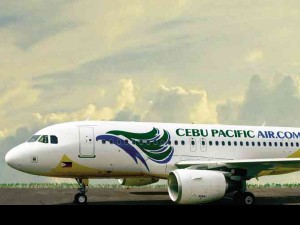Cebu Air Inc., the country’s largest budget airline, plans to acquire the Philippine unit of Singaporean low-cost airline Tiger Airways Holdings Ltd. in a move seen to widen its market share.
Should the deal push through, Cebu Air, a unit of conglomerate JG Summit Holdings and operator of Cebu Pacific Air, could end up owning 100 percent of Tigerair Philippines, said Carmelo Arcilla, Civil Aeronautics Board executive director.
The proposed acquisition will have to pass several regulatory hurdles, including the approval of the Securities and Exchange Commission and the CAB, which is looking into the deal’s competitive and legal implications, Arcilla said in an interview Friday.
“It is still under evaluation,” said Arcilla, adding that a decision from the CAB could be ready within the month.
“We are looking at its effect on routes, traffic and slots. There is also the legal side,” he said.
Arcilla said they were made aware of Cebu Pacific’s intention to acquire Tigerair Philippines last month.
Cebu Pacific seeks to widen its market presence amid stiff competition among rival airlines like flag carrier Philippine Airlines and the local units of Malaysia’s AirAsia Bhd.
AirAsia also has plans to increase its minority stake in AirAsia Zest.
Cebu Pacific flew half of the 15.41 million passengers that took domestic flights in the first nine months of the year, data from the CAB showed. The remainder was divided among five other carriers, led by chief rival Philippine Airlines and its sister firm, PAL Express.
Tigerair Philippines has been posting uneven financial results. It cornered 4.7 percent of domestic air travel in the nine months to September.
In terms of international flights, Cebu Pacific is the second biggest local carrier at 16 percent while Tigerair Philippines had about 1.5 percent in terms of passenger volume, the CAB reported.
JG Summit senior vice president Bach Johann Sebastian confirmed in a text message yesterday that Cebu Pacific has been looking “into opportunities for strategic alliances and ac quisitions.”
But he added that the conglomerate could not disclose any definite agreement at this time.
Tigerair Philippines CEO Olive Ramos did not comment on the proposed deal, saying she was not privy to any discussions.
Tigerair Philippines, which operates out of Clark and Manila, was formed after Tiger Airways acquired a 40-percent stake in Southeast Asia Airlines, which was later rebranded.
With a fleet of 48 medium-range and long-range aircraft, Cebu Pacific was the sixth largest among 47 budget carriers operating in the Asia Pacific, data from Capa–Centre for Aviation showed.
The largest was Indonesia’s Lion Air, while Tigerair Philippines ranked 40th, Capa said.
Tigerair Philippines has sought to differentiate itself from the competition by offering more leg room and giving options, for a fee, for passengers seeking more than the typical “no-frills” services associated with the budget airline business model.
While its current fleet is among the smallest among local carriers, it plans to boost this to 25 planes in three to five years, Ramos said in a previous briefing.


